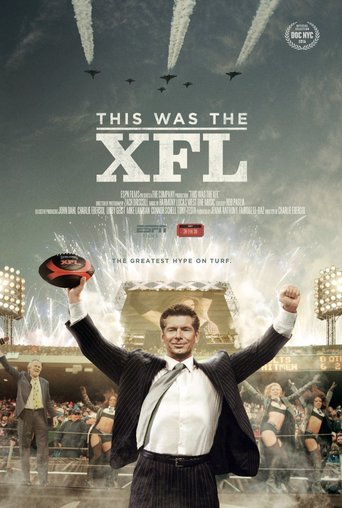 Today, the XFL might be thought of as a footnote in the history of televised professional sports — or, if you’re less forgiving, thought of as a punchline — but as a teenager in 2001 (as I was) the idea of a football league that would feature violent play and scantily-clad cheerleaders seemed like the fulfillment of what movies like Death Race 2000 and The Running Man promised about sports in the future. As all football fans know, the XFL — founded by pro wrestling czar Vince McMahon and NBC Sports executive Dick Ebersol — folded after a single trouble-plagued season. ESPN’s wildly entertaining 30 for 30 documentary This Was the XFL, which was directed by Ebersol’s son Charlie Ebersol, is both a fascinating analysis of what worked and what didn’t about the league and a compelling look back at one of the most ambitious failures in the history of American professional sports.
Today, the XFL might be thought of as a footnote in the history of televised professional sports — or, if you’re less forgiving, thought of as a punchline — but as a teenager in 2001 (as I was) the idea of a football league that would feature violent play and scantily-clad cheerleaders seemed like the fulfillment of what movies like Death Race 2000 and The Running Man promised about sports in the future. As all football fans know, the XFL — founded by pro wrestling czar Vince McMahon and NBC Sports executive Dick Ebersol — folded after a single trouble-plagued season. ESPN’s wildly entertaining 30 for 30 documentary This Was the XFL, which was directed by Ebersol’s son Charlie Ebersol, is both a fascinating analysis of what worked and what didn’t about the league and a compelling look back at one of the most ambitious failures in the history of American professional sports.
This Was the XFL (a riff on McMahon’s memorable growling announcement before the opening game “This is the XFL!”) is primarily about the relationship between McMahon and Ebersol and how the duo built a football league from the ground up in a single year. In 1998, NBC lost the broadcast rights to the NFL, which was an almost-crippling blow to the network. When McMahon announced in February 2000 that he was creating an outlaw football league — as he called it, “smash-mouth, wide-open football” — his longtime friend Ebersol partnered with him almost immediately. But despite an unprecedented level of excitement surrounding the XFL — the premiere game was watched by an astounded 54 million viewers, more than double what NBC expected — the XFL is a classic example of Murphy’s Law, and everything went wrong. Production mishaps (including the infamous “JLo Game”), often poor-quality on-field play, and McMahon’s insistence on amping up the sex appeal with silly cheerleading gimmicks all contributed to the league going bust after its initial season. This Was the XFL features new interviews with all of the principles involved, including Ebersol, McMahon, Jesse Ventura (who was a commentator for the league), coaches, players (including XFL MVP Tommy Maddox and Rod “He Hate Me” Smart) and many others who provide remarkable insight in this postmortem analysis.
One of the more meaningful parts of the documentary is hearing from the players, most of whom were talented athletes but not NFL-caliber players. For them, the XFL offered them a second chance to play pro football, and some (like Maddox and Smart), actually ended up in the NFL because of the talent they showed during the XFL’s lone season. The failure of the league hurt them the most because it squandered an opportunity for them to get to live their dreams.
To be honest, the person who comes off as the “villain” of the documentary is NBC Sports broadcaster Bob Costas. You can tell Costas is trying to come off in a “I told you so” manner regarding the league’s failure, but instead he comes off as a smug know-it-all who never gave his boss’ football experiment a chance. Over 15 years later, he seems to be the person who is the most hung-up about the league. Clips from a contentious interview between Costas and McMahon that was recorded while the XFL was on the skids is a highlight of the documentary, particularly because McMahon’s defensiveness reveals so much about the XFL’s desperation at that time.
What was admirable about the XFL — and the documentary gets this across, perhaps because of Charlie Ebersol’s personal connection — is that while it was a failure, it was an ambitious one that broke new ground in the way football is presented on television. None other than Dallas Cowboys owner Jerry Jones himself admits in the documentary that the NFL’s current TV presentation owes itself to the broadcast developments of the XFL, which is a monumental legacy (McMahon calls it “flattering” that the NFL adopted so many of the XFL’s production ideas in a telling moment — you can tell it bothers him that his dismissed league was raided by the competition for its best ideas).
The documentary ends with a conversation between McMahon and Ebersol about their longtime friendship and various business ventures, and includes some surprising vague hints about an upcoming project they are considering tackling together (again).
This Was the XFL is a must-see for anyone who thinks the XFL is nothing more than a punchline. While it will always be considered one of the biggest jokes in the history of pro sports (and rightfully so), there are some aspects that shouldn’t be pointed at and laughed at. After all, if you’re going to fail, you ought to hope that you fail this spectacularly.
This Was the XFL airs on ESPN on February 2, 2017.

















Recent Comments